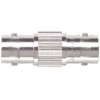I am skeptical about many eBay 50 ohms BNC connectors or accessories. Since its nearly identical to 75 ohms in appearance without very close inspection of construction and the specs, most novices won't notice the difference; its often sold as 50 ohms when its truly 75 ohms, or worse. 50 ohms BNC connectors have a slightly higher premium cost as its primarily used in electronics work whereas 75 ohms are mass produced for the consumer and commercial use video industry.
On a whim, I bought a few splitters, including from a non-authorized distributor then tested them against a real Amphenol connector, which is rated to at least 1 GHz, and maximum at ~ 4 GHz. At 1 MHz square wave, the eBay and non-authorized BNC connector had a small amount of ringing to suggest it was the wrong impedance, at 100 MHz it was 2x in size. Some did not fit properly, and were loose. Splitters cost about $3 each, some as low as $1, whereas Amphenol is about $3-6 each from an authorized source such as Jameco.com.


